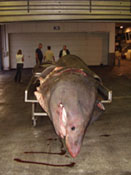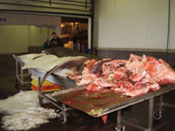Illegal take of basking shark in Belgium

The Shark Alliance was on the scene for today’s fish market display of a six meter, two-ton, female basking shark, landed illegally last night in Zeebrugge, Belgium. The shark was reportedly taken unintentionally by Belgian trawlers fishing in the Celtic Sea. The fishermen say they were unaware that the species, considered Endangered in the Northeast Atlantic, was protected.
The basking shark is one of just two shark species to receive protection in European waters. Last year, the European Union prohibited fishing, retaining, transhipping and landing of basking sharks in all Community, non-Community and international waters. The same protections apply to non-EU vessels fishing in Community waters.

“There are so few safeguards for sharks in Europe; it is critical that all existing regulations are strictly enforced and that a more comprehensive conservation plan is developed,” said Sonja Fordham, Shark Alliance Policy Director who observed the basking shark display and supplied conservation information to reporters on the scene.
In 1999, the European Union pledged to develop a Community Plan of Action for the conservation and management of sharks by 2001. The European Commission now promises the plan by 2008, but there is little evidence of progress toward this important goal. Such a plan should include conservation measures for basking sharks and many more threatened European shark species, as well as educational initiatives to help ensure fishermen are keenly aware of restrictions on shark fishing.
There have been several stories as to the fate of this basking shark. Reported intentions included special auction as well as donation to a supermarket or charity. The last word at the market this morning was that fish workers would dispose of it in line with the protective regulations. Scientists were able to take samples for research. The shark’s huge liver, one of its most valuable parts, had been removed. There was no word on where it had gone.
Several people on the scene remarked that discarding a massive, dead shark at sea would be wasteful. The Shark Alliance points out that, while accidents happen, all incentive to kill basking sharks, including profit or just good publicity, must be removed in order for the regulation to work and rebuild the population. Instead, fishermen should be encouraged to avoid basking sharks in the first place and carefully release any that are caught accidentally.

“If exceptions to fishing rules are made for accidental catches, we are likely to start seeing more accidents – something that this endangered population simply cannot withstand,” added Fordham.
Concerned citizens of EU countries can help by contacting their Fisheries and Environment Ministers and calling for swift production of a strong, science-based shark plan and stricter enforcement of all existing shark fishing rules.









